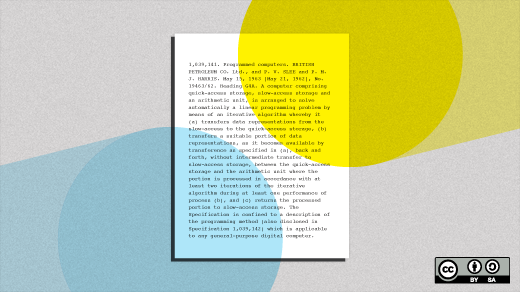The year 2014 continued the trend of the increasing importance of legal issues for the FOSS community. Continuing the tradition of looking back over the top ten legal developments in FOSS, my selection of the top ten issues for 2014 is as follows:
1. Courts interpret General Public License version 2 (GPLv2)
The GPLv2 continues to be the most widely used and most important license for free and open source software. Black Duck Software estimates that 16 billion lines of code are licensed under the GPLv2. Despite its importance, the GPLv2 has been the subject of very few court decisions, and virtually all of the most important terms of the GPLv2 have not been interpreted by courts. This lack of court decisions is about to change due to the five interrelated cases arising from an attempt by Versata Software, Inc. (Versata) to terminate its software license to Ameriprise Financial, Inc. Versata’s product included software licensed by Ximpleware, Inc. (Ximpleware) under the GPLv2, but Versata had not complied with the terms of the GPLv2. Ximpleware sued Versata and eight of its customers for both copyright and patent infringement. (For a more detailed description of the facts read this article.) This dispute is important because Ximpleware is the first commercial enforcer of the GPLv2 in which the courts are likely to issue decisions and Ximpleware is seeking monetary damages rather than compliance.
2. GPL guides
Two of the most important organizations enforcing the GPL family of licenses recently provided guidance on compliance: On October 31, the Software Freedom Law Center published the second version of their Practical Guide to GPL Compliance. Several days later, the Software Conservancy and the Free Software Foundation published the first version of their guide, the Copyleft, and the GNU General Public License: A Comprehensive Tutorial and Guide. These guides are required reading for anyone managing FOSS.
3. EU Commission (EC) to revise FOSS policy
Governments are one of the most important users of software but have had a mixed record in using and contributing to FOSS (free and open source software). The EC recently announced that it intends to remove the barriers that may hinder code contributions to FOSS projects. In particular, the EC wants to clarify legal aspects, including intellectual property rights, copyright, and which author or authors to name when submitting code to the upstream repositories. Pierre Damas, Head of Sector at the Directorate General for IT, hopes that such clarification will motivate many of the EC’s software developers and functionaries to promote the use of FOSS at the EC.
4. Validation of FOSS business model by Hortonworks IPO
Hortonworks provides services and support for the Hadoop data analysis software managed by the Apache Software Foundation. Hortonworks is one of three venture backed companies based on the Hadoop software. Hortonworks went public this fall and immediately rose 65% in share price, valuing the company at over $1 billion. The market for Hadoop products, software, and services is projected to reach $50.2 billion in 2020, up from $1.5 billion in 2012.
5. Core Infrastructure Initiative
The Linux Foundation put together a consortium of companies to support the many smaller open source projects that are critical to software ecosystem, such as OpenSSL. This effort was a response to the Heartbleed problem with OpenSSL in 2013, which I described in last year’s summary. This consortium is a great example of the ability of the FOSS community to come together to solve community problems.
6. Linux SCO case terminated again
The lawsuit by Santa Cruz Operations, Inc. (SCO) against IBM claiming that Linux includes Unix code was once a potentially major challenge to FOSS. Despite losing its suit against Novell, the bankruptcy court allowed SCO to continue its suit against IBM. I thought this case had been concluded in 2008, but Judge Nuffer appears to have put the case to rest on December 15, 2014. He dismissed the case against IBM based on the decisions in the Novell case (although SCO could still appeal once again):
It is further ORDERED that, with respect to all remaining claims and counterclaims, SCO is bound by, and may not here re-litigate, the rulings in the Novell Judgment that Novell (not SCO) owns the copyrights to the pre-1996 UNIX source code, and that Novell waived SCO’s contract claims against IBM for alleged breaches of the licensing agreements pursuant to which IBM licensed such source code.
7. FOSS trademark issues
The use of trademarks in FOSS projects continues to raise issues. This year brought the settlement of the dispute over the “Python” mark between the Python Software Foundation and Veber, a small hosting company in the UK. Veber had decided to use "Python" in branding certain of its products and services. In addition, the OpenStack Foundation is working through the application of trademarks to the OpenStack project through its DefCore committee.
8. Use of FOSS by commercial companies expands
We have discussed in the past how many large companies are using FOSS as an explicit strategy to build their software. Jim Zemlin, Executive Director of the Linux Foundation, has described this strategic use of FOSS as external “research and development.” His conclusions are supported by Gartner who noted that “the top tech companies are still spending tens of billions of dollars on software research and development, the smart ones are leveraging open source for 80 percent of the code and spending their money on the remaining 20 percent, which represents their program’s ‘special sauce.’” The scope of this trend was emphasized by Microsoft’s announcement that it was “open sourcing” the .NET software framework (this software is used by millions of developers to build and operate websites and other large online applications).
9. Rockstar Consortium threat evaporates
The Rockstar Consortium was formed by Microsoft, Blackberry, Ericsson, Sony, and Apple to exploit the 6,000 patents from Nortel Networks. The Rockstar Consortium sued Google for infringement of the Android operating system. This litigation was aimed at fundamental functions of the Android operating system and could have had a significant effect on the Android ecosystem. The Rockstar Consortium settled its litigation with Google this year, but then sold 4,000 of its patents to RPX, the patent defense firm (financed by a number of companies as well as RPX). The remaining patents were distributed to the members of the Rockstar Consortium.
10. Android litigation
The litigation surrounding Android continued this year, with significant developments in the patent litigation between Apple Computer, Inc. (Apple) and Samsung Electronics, Inc. (Samsung) and the copyright litigation over the Java APIs between Oracle Corporation (Oracle) and Google, Inc. (Google). Apple and Samsung have agreed to end patent disputes in nine countries, but they will continue the litigation in the US. As I stated last year, the Rockstar Consortium was a wild card in this dispute. However, the Rockstar Consortium settled its litigation with Google this year and sold off its patents, so it will no longer be a risk to the Android ecosystem.
The copyright litigation regarding the copyrightability of the Java APIs was brought back to life by the Court of Appeals for the Federal Circuit (CAFC) decision which overturned the District Court decision. The District Court had found that Google was not liable for copyright infringement for its admitted copying of the Java APIs: the court found that the Java APIs were either not copyrightable or their use by Google was protected by various defenses to copyright. The CAFC overturned both the decision and the analysis and remanded the case to the District Court for a review of the fair use defense raised by Google. Subsequently, Google filed an appeal to the Supreme Court. The impact of a finding that Google was liable for copyright infringement in this case would have a dramatic effect on Android and, depending on the reasoning, would have a ripple effect across the interpretation of the scope of the “copyleft” terms of the GPL family of licenses which use APIs.







3 Comments